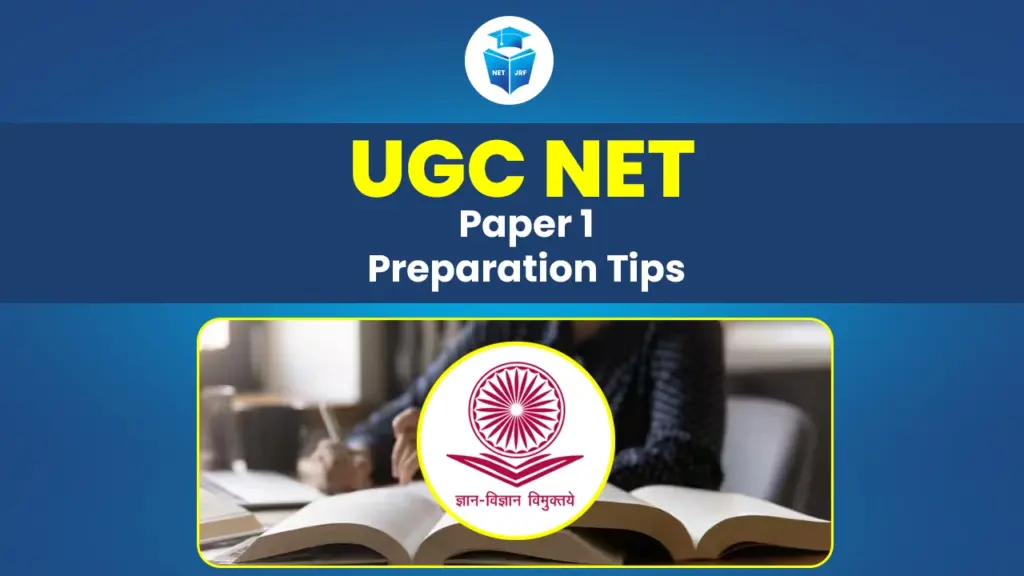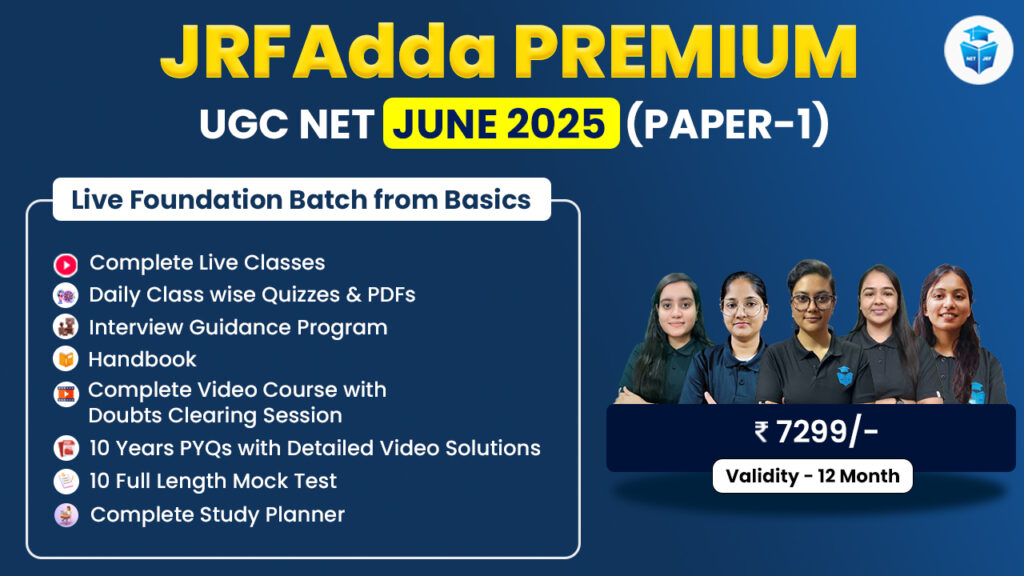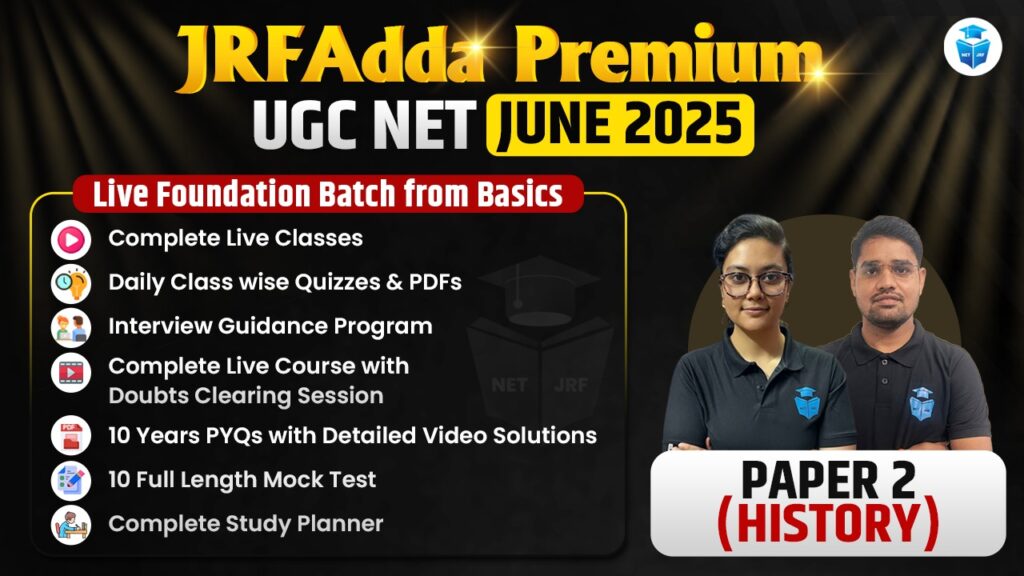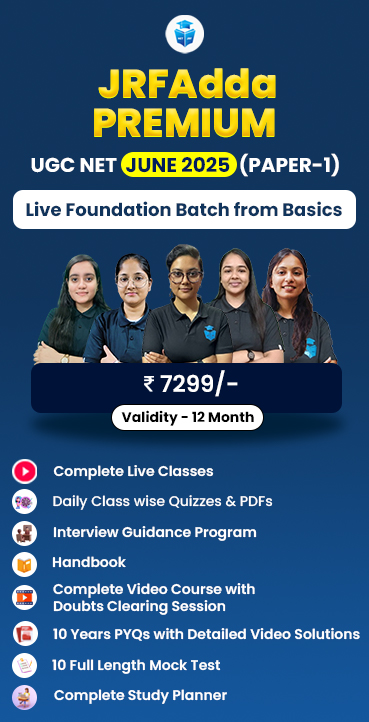UGC NET Paper 1 Preparation Strategy 2025 will assist you in developing a strong plan to crack the exam in June comfortably. Encompassing teaching ability, research, reasoning, and others, the guide offers top topics, tips for time management, top books, and websites to achieve top scores. Adopting the appropriate strategy and performing regular practice sessions, you are sure to pass Paper 1 and move in the direction of your JRF or Assistant Professor aspiration.
UGC NET 2025 Overview
The UGC NET is a competitive exam held by the National Testing Agency (NTA) to identify eligibility for the post of Assistant Professor and Junior Research Fellowship (JRF) in Indian universities and colleges. Paper 1 is a common general aptitude test for every candidate, while UGC NET Paper 2 is subject-oriented. As Paper 1 has a significant bearing on qualifying in UGC NET, a clear-cut preparation strategy is required. This article explains useful UGC NET Paper 1 preparation strategies, key topics, time management methods, recommended books, and online study materials for the exam in 2025.
Also Read: UGC NET Exam 2025
UGC NET Paper 1 Exam Pattern 2025
Before diving into preparation, understand the latest UGC NET Paper 1 exam pattern:
Feature | Details |
Mode of Exam | Computer-Based Test (CBT) |
Duration | 3 hours (180 minutes) |
Total Questions | 50 (All compulsory) |
Maximum Marks | 100 (2 marks per question) |
Negative Marking | No |
Sections | 10 units covering Teaching & Research Aptitude, Reasoning, Comprehension, etc. |
Why is UGC NET Paper 1 Challenging?
- Diverse Syllabus: Consists of 10 diverse units, ranging from teaching aptitude to ICT and current affairs.
- Time Pressure: Completing 50 questions in 3 hours involves speed and accuracy.
- Competitive Cut-off: The top 6% of applicants get through (changes annually).
- Dynamic Current Affairs: Staying updated with recent education policies (NEP 2020, UGC notifications) is vital.
Also Read: UGC NET Exam Pattern 2025 For Paper 1 & 2
UGC NET Paper 1 Preparation Strategy 2025
Whether you are a repeater or a first-time candidate, this strategy will assist you in maximizing your study plan, filling gaps, and gaining confidence prior to the exam. Let us explore the winning preparation roadmap for UGC NET Paper 1 2025. Below are some preparation tips mentioned:
Understand UGC NET Paper 1 Syllabus & Exam Pattern
Before starting preparation, it’s absolutely necessary to thoroughly study the UGC NET Paper 1 syllabus and familiarize yourself with the weightage distribution in various units. Most aspirants make mistakes by reading randomly without any idea about which subjects have higher marks, resulting in a waste of effort. The first step is to analyze the UGC NET Paper 1 syllabus and identify high-weightage topics. The key units are:
Unit | Topic | Weightage | Key Focus Areas |
1 | Teaching Aptitude | 12-14 marks | Teaching methods, Learner characteristics, Evaluation systems |
2 | Research Aptitude | 10-12 marks | Research ethics, Types of research, Thesis writing |
3 | Reading Comprehension | 10 marks | Passages (500 words) with inference-based questions |
4 | Communication | 8-10 marks | Barriers, types, classroom communication |
5 | Reasoning (Logical & Mathematical) | 12-14 marks | Series, analogies, Venn diagrams, statistics |
6 | Data Interpretation | 8-10 marks | Charts, graphs, tables analysis |
7 | ICT | 8-10 marks | Basics of computers, internet, e-learning tools |
8 | People & Environment | 6-8 marks | Sustainable development, environmental issues |
9 | Higher Education System | 8-10 marks | Policies, governance, accreditation bodies |
10 | Current Affairs | 6-8 marks | Last 6 months national/international education news |
Smart Preparation Strategy Based on Weightage
High Priority (30+ marks)
- Units 1, 2, 5 (Teaching/Research Aptitude + Reasoning)
- These are the core scoring areas.
Medium Priority (20-25 marks)
- Units 3, 4, 6, 7 (Comprehension, Communication, DI, ICT)
- Require conceptual clarity + practice.
Low Priority (15-20 marks)
- Units 8, 9, 10 (Environment, Education System, Current Affairs)
- Can be done through revision notes
Common Mistakes to Avoid
- Omitting Reading Comprehension practice (highly scoring if practiced)
- Over-studying People & Environment at expense of Reasoning
- Saving Current Affairs for last week (should be updated regularly)
- Not verifying updates to official NTA syllabus
3-Month Preparation Plan for UGC NET Paper 1
Phase 1: Building the Base (Month 1)
- Week 1-2: Finish Teaching Aptitude (Unit 1) & Research Aptitude (Unit 2)
- Week 3: Give emphasis on Reasoning (Unit 5) & Data Interpretation (Unit 6)
- Week 4: Learn Communication (Unit 4) & Reading Comprehension (Unit 3)
Phase 2: Preparation at Advanced Level (Month 2)
- Week 5-6: Study ICT (Unit 7), Environment (Unit 8), Higher Education (Unit 9)
- Week 7: Revisit Current Affairs (Unit 10) (Recent 6 months news)
- Week 8: Practice previous year papers (2018-2024)
Phase 3: Revision & Mock Tests (Month 3)
- Day by day: Solve 1 full-length mock test (NTA pattern)
- Review weak spots and make corrections
- Last week: Concentrate only on high-weightage subjects & rapid revisions
Best Study Techniques for UGC NET Paper 1
- Active Learning (Not Reading Only)
- Short-point note-making for rapid revision.
- Apply mnemonics to remember facts.
- Assist a friend in learning concepts to establish confidence.
Focus on High-Marking Sections
Prioritize the following first:
- Teaching & Research Aptitude (12-15 marks)
- Reasoning & DI (10-12 marks)
- Reading Comprehension (10 marks)
Daily Current Affairs Routine
- Read The Hindu / Indian Express (Education Section)
- Subscribe to YouTube channels (JRFAdda for daily updates)
- Make use of monthly magazines (Pratiyogita Darpan, AffairsCloud)
Practice Previous Year Papers (2018-2024)
- Assists in recognizing repetitive question patterns.
- Enhances time management & accuracy.
Important Topics for UGC NET Paper 1
The syllabus comprises ten sections, each with equal weightage. Following are the most crucial topics:
- Teaching Aptitude
- Teaching-learning process
- Methods of teaching
- Learner’s characteristics
- Evaluation systems
- Research Aptitude
- Research methods
- Types of research
- Hypothesis and sampling
- Research ethics
- Reading Comprehension
- Passage-based questions
- Analytical reasoning
- Communication
- Types and barriers of communication
- Effective classroom communication
- Mathematical Reasoning and Aptitude
- Number series, coding-decoding
- Percentage, ratio, and proportion
- Logical reasoning
- Logical Reasoning
- Syllogism, analogies, and argument structure
- Indian logic (Nyaya school)
- Data Interpretation
- Charts, graphs, and tables
- Percentage and ratio analysis
- Information and Communication Technology (ICT)
- Basics of computers and the internet
- Digital initiatives in higher education
- People, Development, and Environment
- Environmental issues
- Sustainable development goals
- Higher Education System
- Policies and governance
- Evolution of higher education in India
Time Management for Paper 1
Time management is the most important aspect in solving UGC NET Paper 1. You have 50 problems to solve in 180 minutes (3 hours). So, you have only 3.6 minutes on average to attempt each question. Yet, some sections take longer to attempt, while others are easy to solve. Here’s a clever time management plan to score the best:
Section-wise Time Distribution
Section | Approx. Questions | Time to Spend | Priority |
Teaching Aptitude (Unit 1) | 5-6 | 20-25 mins | High |
Research Aptitude (Unit 2) | 5-6 | 20-25 mins | High |
Reading Comprehension (Unit 3) | 5 | 20-25 mins | Medium |
Logical Reasoning (Unit 5) | 5-6 | 25-30 mins | High |
Data Interpretation (Unit 6) | 5 | 20-25 mins | Medium |
ICT (Unit 7) | 5 | 15-20 mins | Medium |
Higher Education (Unit 9) | 5 | 15-20 mins | Medium |
People & Environment (Unit 8) | 3-4 | 10-15 mins | Low |
Current Affairs (Unit 10) | 3-4 | 10-15 mins | Low |
Revision & Leftover Questions | – | 15-20 mins | Critical |
Mock Test Strategy for Time Optimization
- Take 2-3 full-length mocks a week (mimic actual exam pressure).
- Review time spent per section (find slow areas).
- Work on weak areas (e.g., if DI is taking too long, practice more).
Time Management in Exam (3-Hour Strategy)
Time Slot | Action Plan |
First 30 mins | Solve Teaching & Research Aptitude (Easy & Scoring) |
Next 45 mins | Attempt Reasoning, DI, Comprehension (Moderate Difficulty) |
Next 45 mins | Focus on ICT, Environment, Higher Education |
Last 30 mins | Revise + Solve Leftover Questions (No negative marking, so attempt all) |
Best Books for UGC NET General Paper
Preparing for UGC NET Paper 1 using the correct material that covers all 10 units in a thorough manner. Post analyzing toppers’ strategy and new exam patterns, following are the most suggested books for preparation in 2025:
Category | Book Title | Author/Publisher | Key Features | Best For |
Comprehensive Guide | Trueman’s UGC NET/SET Paper 1 | M. Gagan & Sajit Kumar | Complete syllabus coverage | Beginners & conceptual understanding |
Chapter-wise questions | ||||
Previous year papers included | ||||
Practice Questions | Arihant’s UGC NET/JRF/SET Paper 1 | Arihant Publications | 5000+ practice questions | Extensive practice & mock tests |
10+ model papers | ||||
Detailed solutions | ||||
Logical Reasoning | A Modern Approach to Logical Reasoning | RS Aggarwal | 1000+ reasoning questions | Unit 5 (Logical Reasoning) |
Shortcut techniques | ||||
Mathematical reasoning focus | ||||
Higher Education | UGC NET Paper 1 – Higher Education System | Disha Experts | NEP 2020 updates | Unit 9 (Higher Education System) |
Regulatory bodies | ||||
Current education policies | ||||
ICT & Digital Literacy | ICT for UGC NET | Kumar Sanjay | Simplified tech concepts | Unit 7 (ICT) |
Latest digital trends | ||||
MCQ practice | ||||
Teaching/Research Aptitude | NTA UGC NET/JRF Teaching & Research Aptitude | Pearson | Pedagogical concepts | Units 1 & 2 |
Research methodology | ||||
Case studies | ||||
Current Affairs | Lucent’s General Knowledge | Dr. Binay Karna | Monthly updates available | Unit 10 (Current Affairs) |
Education sector focus | ||||
Concise format |
Online Resources for UGC NET Paper 1
- NTA Official Website (https://ugcnet.nic.in/) – Official notifications and sample papers.
- JRFAdda – Platform dedicated to mock tests, study material, and guidance from experts.
- YouTube Channel – Channel like JRFAdda offer free lectures.
Conclusion
Cracking UGC NET Paper 1 in the June 2025 exam demands a planned strategy, practice on a regular basis, and proper study material. Knowing the syllabus, emphasizing high-weightage questions, and time management will greatly enhance your prospects of clearing the exam. Utilize mock tests, previous year papers, and online study materials like JRFAdda to enhance your preparation. Stay regular, practice extensively, and go for the exam confidently. With adequate commitment and a smart study plan, you can achieve your goal of getting qualified for JRF or Assistant Professor.
UGC NET Paper 1 Preparation Tips 2025 FAQs
3-4 months of intense preparation daily studying for 3-4 hours is good enough to cover the syllabus and practice mock tests.
Trueman’s UGC NET/SET Paper 1 by M. Gagan, Arihant’s UGC NET Paper 1, and RS Aggarwal’s Logical Reasoning are some of the recommended books.
Prioritize high-weightage subjects, solve previous year papers, try full-length mock tests, and enhance time management while writing the exam.
The topics with the maximum scores are Teaching Aptitude, Research Aptitude, Logical Reasoning, Data Interpretation, ICT, and Reading Comprehension.
No, negative marking is not there, hence candidates should try all the questions.













